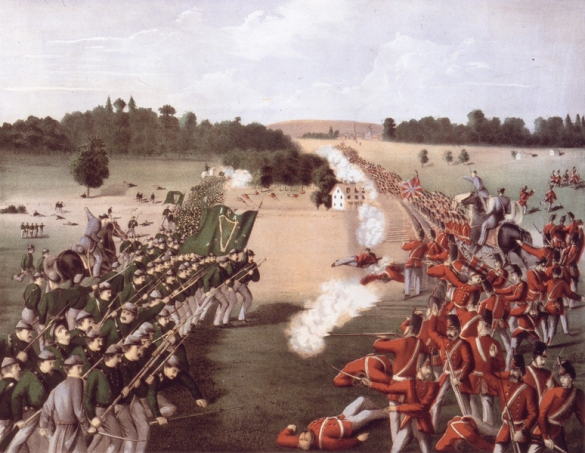The Irish Invade Canada April 12, 2012
Author: Beach Combing | in : Modern , trackbackBeachcombing used to run a series of tags on weird wars and he thought that he would resurrect these with references to one of strangest invasions in world history. 11 June 1866 between 600 and 800 Irish Fenians based in the United States declared war on the British Empire with its population running to hundreds of millions. Now if they had declared war and nothing more then this would have been another sterile act of nationalism by a group who could ‘talk the talk’ but was not always ready to ‘walk the walk’. But, after the declaration, Erin’s warriors then proceeded to cross the Niagara River and started, incredibly, a successful-ish invasion of Canada.
The Fenians were usually well infiltrated by British security forces. But in the US this infiltration was clearly lacking and an army was gathered and organized without the authorities in Canada learning anything. Once it had started there were two reasons that Britain and its North American dominion had to fear the attack.
First, many of those involved were the victims or the children of victims of the potato famine of the late 1840s. There are still arguments about Britain’s culpability in that pitiful episode, but what is certain is that the Irish diaspora blamed London for the halving of the Irish population c. 1840.
Second, many of the ‘Irish’ soldiers (how many spoke Gaelic Beach wonders?) had fought on the Union side in the Civil War. These were not then some Irish drunks with broken bottles singing Danny Boy and looking to beat up a peeler. This was a trenchocracy of hardened soldiers about to strike a blow against the hated Brits Canadians.
In that rather naïve fashion of political passionates the Fenians reckoned that the oppressed of Canada would flock to the standard: French-speakers, Roman Catholics, the poor… As it was the Canadians pulled a militia together and marched out to meet the Fenians at the battle of Ridgeway fought on 2 June.
Ridgeway is a peculiar battle not only because it involved Irish combatants an ocean away from Ireland. It also saw extraordinarily, Beach is tempted to write unbelievably, low casualties. About 700 men fought on both sides and yet four or five or perhaps six Fenians were killed and about twelve Canadians: a civilian woman was also accidentally shot by the ‘imperial’ forces.
The Fenians defeated the Canadians: though quite how with the rather unserious biffing that went on is a nice question. They took a number of Canadian prisoners and, how they must have whupped with joy, one British private in chains. But they then heard news that the ‘regulars’ were marching on them and sensibly let their prisoners go and skeddadled back to the US side of the border, leaving Washington and London to shout hysterically at each other.
Not that it did much good: in the next five years Fenian invasions of Canada became something of a hobby among Irish Americans. In Canada, meanwhile, habeas corpus was suspended and a medal was minted that pretty much says it all.
Any other freelance invasions? Drbeachcombing AT yahoo COM
***
17 April 2012: The great Mike Dash writes in: There are “men who would be king” stories, and then there is the saga of William Walker, the American journalist who led several private armies – the “filibusters” – into central America in the 1850s. A great believer in white supremacy and Manifest Destiny, Walker kicked off with a 45-man invasion of Baja California and managed to hold it briefly as the Republic of Lower California before being ejected by the Mexicans. Seeking a softer target, he raised a second tiny force and invaded Nicaragua in 1854. Opportunely arriving in the middle of a civil war (perhaps not such an unlikely coincidence in the Americas of that period) with a mere 60 men, he recruited a few more locally and took sides, backing the Democrats against the Legitimists and fairly rapidly succeeding in installing himself as the power behind a Democratic government. From there he was but a short stab in the back from setting himself up as President of Nicaragua. Walker controlled the country for about a year, thanks in part to the financial backing of good old Cornelius Vanderbilt, and made plans to extend his rule to neighbouring countries. He also tried to recruit more men from the Southern US states by proposing to reintroduce the institution of slavery, outlawed in Nicaragua in 1824. His career ended messily; expelled by a coalition of Guatamalan, Honduran and Salvadorian troops, Walker made an attempted comeback in 1860 only to fall into the hands of a Royal Navy squadron based on the Mosquito Coast. The British handed him over to the Hondurans, who shot him in September 1860. I am sure there must be quite a few other examples – the founders of quite a few Chinese dynasties started out as minor league peasant rebels, for instance – but Walker is probably the most spectacular relatively recent one; and despicable as his intentions were, his military successes, however short-lived, do faintly echo those of Stout Cortez. I thought enough of Walker’s story to pitch the idea as a book a few years back, but oddly enough American publishers weren’t interested in a study of maverick right-wing American Exceptionalists wreaking havoc in less technologically advanced nations on behalf of the nineteenth century equivalent of Big Oil. Thanks Mike!



